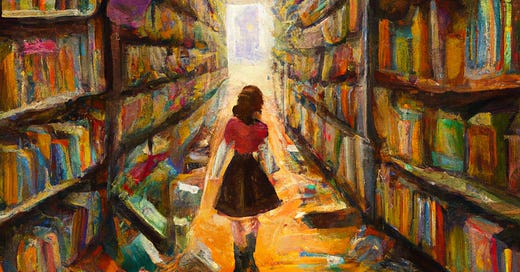Jean-Paul Sartre is a French philosopher who once said, “I can always choose, but I ought to know that if I do not choose, I am still choosing.”
We are, literally, the sum of our choices. Even stagnation has consequences.
The overwhelming fear of choosing wrong
I had my first and only panic attack when I was sixteen-years-old. My friends and I attended a funeral for one of our classmates whose father had passed away. The boy got on stage and talked about his dad – his face blank with the eery serenity of someone still very much in shock – and I remember staring down at my hands folded in my lap, an unsettling feeling of dread blooming rapidly in my chest, like a flower opening towards the sun.
After the service, I got into my car and I couldn’t breathe. My throat closed. My tongue swelled. My heart hammered out of control. The air was a monster I was trying, and failing, to wrestle into my lungs. I started to gasp, to cry, to hyperventilate. I was drowning in plain sight. I was going to die. They’d find my body days later, in the sticky summer heat of my own car, still in the same black sundress I had worn to the funeral.
I didn’t die, of course. But hearing my classmate recall memories of his father up on stage woke something up within me. One day I’m gonna die and I’ll have to deal with the consequences of every decision I’ve ever made.
During this time, I was getting recruited to play college basketball and my life was boiling over with choices. Where do I want to go? What school? What city? What coach? What team? Where do I go after that? Who do I want to become?
At first, this freedom was exciting. I remember having lunch in a Mediterranean cafe on Princeton’s campus, enveloped in a sea of black and orange, right before I had a meeting with a professor at the library where F. Scott Fitzgerald wrote This Side of Paradise. I could see myself here, I thought.
I remember walking through College of Charleston’s cobblestoned campus, Spanish moss dripping from the trees, bees humming around the fragrant perfume of flowers, students walking, biking, and skating around me, skipping class to go to the beach. I would love it here, I thought.
On a random Tuesday afternoon, I remember getting a call from Harvard. I flew down the stairs to tell my parents, and we laughed incredulously together in the kitchen. Harvard? Can you imagine?
I was on the cusp of becoming so many different people. But overtime, the tantalizing taste of this idea turned sour, like spoiled milk in the back of the fridge. I had so much say in my own life that it became a burden. Soren Kiergaard, another existentialist philosopher, once said:
“Anxiety is the dizziness of freedom.”
This explains how I ended up alone in my car, gasping like a fish in the face of my impending mortality. The freedom of it all was unbearable. What if I chose wrong?
Allow “freedom” to inspire you, not terrify you
I recently read “The Midnight Library” – a novel about the infinite possibilities of life.
A girl named Nora hates her life and tries to kill herself; but instead of dying, she finds herself in Purgatory – which, for her, happens to be an aesthetic library. The library is infinite. It continues forever. And each book on the shelf is a different life that she could have lived. She’s given one last choice: continue on her journey of death, or choose a life worth living?
Jean-Paul Sartre would have loved it.
This book struck a chord with me – I think, perhaps, because I’m still haunted by the ghosts of all the women I didn’t become. Somewhere in the Princeton library, there’s a girl who looks just like me, her nose buried in Fitzgerald. Somewhere on Folly Beach, there’s a girl with frizzy hair laying in the sun, skipping class. I definitely don’t have a spinoff story at Harvard, so we won’t even go there. But in the end, the book explores how there is no “right” or “wrong” life. We’re going to make plenty of “wrong” decisions, of course…but is that not the “right” way to become the people we’re meant to become?
It’s the only way.
When Nora was in The Midnight Library, there was no objectively “right” or “wrong” story of her life. There were things she liked and disliked about all of them. So, what did she choose? To return to her normal life and focus on living it. Nora had seen how choices in her alternative lives had panned out – and it wasn’t half as terrifying as she thought. It actually inspired her to live a more daring and adventurous life.
As our good friend Kiergaard famously said:
“Life can only be understood backwards; but it must be lived forwards.”
There’s no denying that life feels like a one-way flight to an unknown destination; one determined by the choices we make along the way. Some find this terrifying – resulting in random panic attacks or attempted suicide that transports them to a mysterious library. Others think it’s the adventure of a lifetime. But you can’t be both. You’ve got to choose.





Another G’s gem. This is beautiful and its underlying messages so powerful. Make your own mistakes, and try to always make new mistakes, as therein lies the essence of growth. This is why I tend to not give or seek advice. Thanks for writing this. Loved it.
As an entrepreneur for the last 45 years it's always a new blend of simultaneous panic and exhilaration. If I want to play on the front lines of my own life it seems I have to accept both. My personal aim is to learn to panic with as much grace and humor as I can muster.